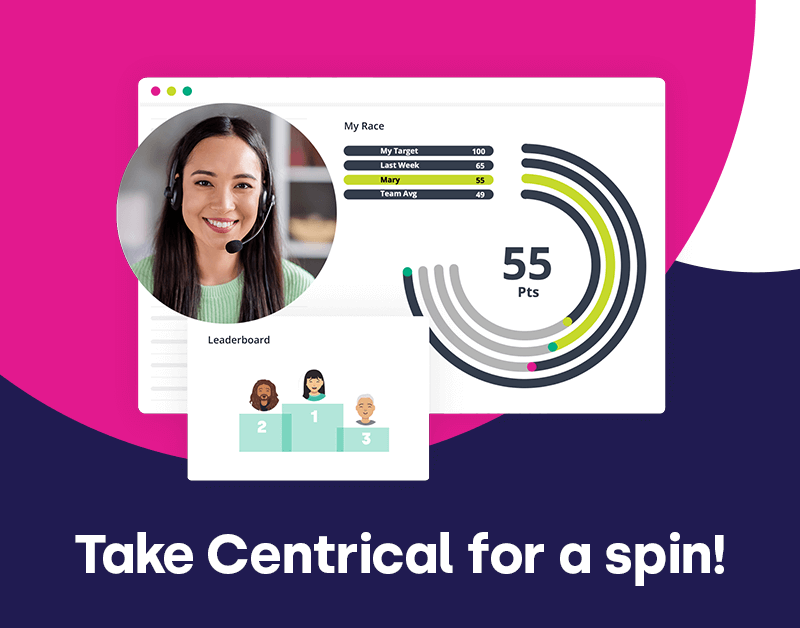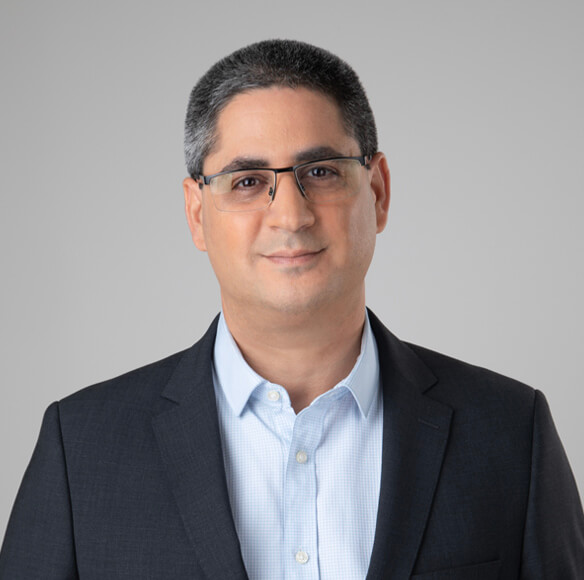Conversational AI models (most notably, ChatGPT) are taking the world by storm. As with any new technology, finding realistic perspectives lies somewhere between the evangelists and the naysayers. To further explore this latest tech wave, Centrical CTO Doron Neumann and VP of Product Linat Mart spoke with Centrical’s Andrea Meyer to discuss some opportunities, concerns, and how Centrical is harnessing this new technology to empower frontline employees in the contact center. Learn more about the Centrical platform’s latest AI capability.
Andrea Meyer: ChatGPT has been making headlines everywhere since it launched in late Nov. 2022. How are we leveraging AI today to drive value for Centrical customers?
Linat Mart: By the time this gets published, who knows how many models will be on the market? There are a lot of different AI content engines currently available, with some, such as ChatGPT, getting most of the attention. Centrical has leveraged AI for years as part of our platform, particularly around learning, coaching, and feedback.
For instance, when an employee finishes a microlearning module or a sequence, our AI engine triggers the next learning material based on what the employee has finished and their success. This also triggers data that is used for coaching, providing managers insight into what employees are learning, and where they are struggling and helps provide guided actions for coaching conversations, as part of a continuous feedback loop.
As we continue to innovate and leverage new generative AI capabilities, we’re excited to bring quick-start microlearning generation to market, which will enable our customers to accelerate the speed at which they produce effective learning and quiz content in the platform by auto-generating content for them. We will continue to leverage AI to personalize the delivery of this content to match the preferences of users as well.
AM: In a previous discussion, you both mentioned that AI-generated content still needs a human touch. Can you speak to what this would look like, and how humans and AI can peacefully coexist?
Doron Neumann: I’ll start off by saying that coexisting is key here – we won’t be replaced by robots! ChatGPT and models like it can create effective content, at scale, very quickly with less effort. A bot will provide suggestions, such as questions and answers. But it will still need a human touch. For instance, a customer-facing chatbot has no intrinsic understanding of customer needs or their emotional state. People are still needed to provide empathy and respond to emotion. An important competency that humans have that an AI like ChatGPT does not is “thinking out of the box,” or otherwise proposing a new solution for a customer’s problem. ChatGPT is great at detecting patterns and learning from them, mixing and meshing them up, but not as good at creating new solutions.
This is one thing humans are still very good at.
LM: Humans are also still very much needed for tasks, such as fact-checking and validating, copy refinement, etc. While there are many discussions around ChatGPT and the future of work, as Doron said, we won’t be replaced by robots – the more complicated tasks will still require humans. For instance, post editing. AI content generation is not at the point that you would automatically upload posts or articles; they may require some editing and creativity. So that’s an example of humans and AI working together. That is what our platform is enabling – giving customers the ability to very easily and quickly create micro content, and still work with it to personalize it and make it unique to their brand’s voice.
AM: Let’s talk for a moment about regulated industries, such as banking, financial services, insurance, etc. What are the concerns around AI in this area? Where are the opportunities?
DN: There is certainly potential for both opportunities and risks for regulated industries that adopt AI content generators. One of the major risks is around ownership of the content that is shared, and of course, the risk of disseminating PII (personally identifiable information). From a tech standpoint, it is critical to develop a strong framework and security controls. This includes ensuring that any IP (intellectual property) that is part of the information known to the model does not become part of its learning feedback loop to be used outside of the organization.
AM: To follow up, how can enterprises securely use ChatGPT to scale and personalize their employee training?
DN: Enterprises will have their own method of using content tools. But scaling content creation just got easier – models such as ChatGPT take on the bulk of content creation. But again, this could potentially be tempered by data privacy concerns. For instance, what happens to enterprise data when I submit an article? Will ChatGPT save that article and use it later outside of my enterprise, or build content using our proprietary data?
We don’t (yet!) have any definitive answers to these questions, but it is imperative to provide some kind of layer between the organization and the AI tech to ensure no private sensitive information is compromised when content is uploaded. We’re forecasting that we will be able to successfully integrate these security and privacy tools into our platform and take that burden from our customers’ IT teams and admins.
LM: To add to what Doron just spoke about, other AI content generation models are quickly evolving that can also address security concerns. From a product standpoint, we are model agnostic. These engines will change as the conversation around privacy and regulatory requirements continues, and we’re watching and listening closely as we work to keep our platform current with new models.
AM: How are we prioritizing leveraging this new technology on the Centrical platform?
DN: From a tech standpoint, we’re integrating this technology into our product to enable customers to easily and efficiently create and provide any type of content – video, audio, presentations, etc. In short, we are leveraging the tech to help customers generate effective microcontent faster and with less effort.
LM: Agreed – we’re really interested in the ease and efficiency angles for our customers, especially around content, video and simulation creation. For example, creating a video using Generative AI is much easier than traditional methods and is much more engaging than reading text. Additionally, customers can still personalize this content, including tone, level of complexity, etc.
AM: Thank you for your time and insights. As we close out this interview, do you have any additional thoughts to share on ChatGPT?
LM: The landscape is evolving, and there is a lot of conversation that will help inform that evolution. At Centrical, we’re committed to providing our customers with cutting-edge and personalized experiences, so we will evolve with this technology while speaking with customers, discussing their needs, and keeping an eye out for high-value use cases to implement. The future will be all about leveraging the right AI model for the right task, integrating between multiple models and technologies while training AI models to reach the optimal high-value and low-cost solution.
DN: The technology, and the rate that it is changing, is fascinating. I’m very much looking forward to seeing how tech and practices shift. To echo Linat, our team will be paying close attention to what new models pop up, their capabilities, and how we can harness those capabilities as part of our platform to make our customers’ jobs easier while continuing to provide the personalized, flexible experience that our customers expect.
We invite you to learn more about Centrical, our newest AI capability, and what we do by watching a quick preview of our platform in action and scheduling. And don’t forget to follow us on LinkedIn for company and industry news, thought leadership, and more.
About
Doron Neumann
Doron is the Chief Technology Officer (CTO) of Centrical, a leading provider of an employee performance management, learning, and engagement platform. He is a seasoned tech executive with expertise in building software solutions from the ground up. Doron has been with Centrical right from the start, Doron is in charge of the technological vision of Centrical, constantly looking for new ways to provide value to customers and users.
Linat Mart
Linat Polak Mart has over 15 years of expertise in managing product strategy and operations in high-volume organizations. Previously, she held the role of Head of Product Experience and Communications for LivePerson, a leading conversational AI platform, where she played a crucial part in delivering significant product innovation and customer growth. Prior to her time at LivePerson, she held multiple senior product roles at NICE, a leading enterprise customer experience (CX) software provider, including Director of Product Portfolio and Director of Product Management. Linat holds an MBA from Tel Aviv University and a BA in Computer Science from Reichman University (IDC Herzliya). She graduated magna cum laude from both institutions.
Engage and motivate your frontline teams
Improve performance with an AI-powered digital coach
Deliver world class CX with dynamic, actionable quality evaluations
Boost performance with personalized, actionable goals
Nurture employee success with the power of AI
Listen and respond to your frontline, continuously
Drive productivity with performance-driven learning that sticks
Drive agent efficiency, deliver client results
Keep tech teams motivated and proficient on products and services while exceeding targets
Maintain compliance while building customer happiness and loyalty
Enlighten energy teams to boost engagement
Engage, develop, and retain your agents while driving better CX
Improve the employee experience for your reservations and service desk agents








 Dalit Sadeh
Dalit Sadeh April Crichlow
April Crichlow Ella Davidson
Ella Davidson Linat Mart
Linat Mart Gal Rimon
Gal Rimon Jayme Smithers
Jayme Smithers Doron Neumann
Doron Neumann Daphne Saragosti
Daphne Saragosti Ronen Botzer
Ronen Botzer Ariel Herman
Ariel Herman